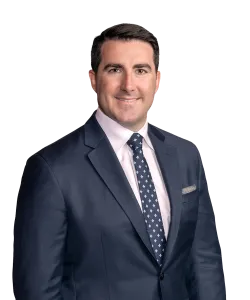Private Equity Firm Not Liable for Alleged FCA Retaliation Claims by Former Employee of Portfolio Company
Headlines that Matter for Companies and Executives in Regulated Industries
Private Equity Firm Not Liable for Alleged FCA Retaliation Claims by Former Employee of Portfolio Company
The District Court for the District of Nebraska addressed whether a private equity owner could be liable as an employer — or alter ego — of a portfolio home health care company that allegedly retaliated against a purported False Claims Act (FCA) whistleblower. At a time when private equity firms face increased risk of FCA enforcement and liability for the actions of its portfolio companies, the decision offers a practical reminder of how corporate separateness and employment relationships can shape the viability of FCA retaliation claims.
The dispute began after private equity firm Pharos Capital Partners acquired Charter Health Care and installed former Pharos employee Steven J. Larkin as the new CEO of Charter. In February 2021, Charter and Pharos acquired Physmed Home Health Care and Serene Care Hospice, both of which were run by plaintiff Jacob Panowicz. As alleged by Panowicz, his employees brought to his attention billing irregularities indicative of approximately $15 million in fraudulent billing to Medicare, Medicaid, and private insurers, and when he raised these allegations directly with Larkin, he was fired on the spot.
Panowicz then brought discrimination and whistleblower retaliation claims against Charter, asserting that Charter terminated him because of his efforts to report suspected fraud in violation of the FCA and Nebraska’s anti-discrimination laws. After Charter filed for bankruptcy, Panowicz sought to amend his complaint to add Pharos, seeking to hold the private equity owner liable as his employer or, alternatively, as the alter ego of Charter.
Pharos moved to dismiss, arguing that the complaint failed to plausibly allege the requisite employer-employee relationship and that it did not show Pharos knew of any protected activity by Panowicz.
On the threshold issue of employer status, the court concluded that Panowicz had not adequately pleaded that he was an employee of anyone other than Charter. Although Panowicz cited non-binding authority for the proposition that the FCA’s whistleblower protections extend beyond formal employees to “employment-like” relationships, the court noted that other appellate decisions had refused to read “employee” so broadly and had rejected claims by non-employee applicants. In short, on the facts alleged, Pharos did not qualify as his employer for purposes of FCA retaliation protections.
The court also rejected Panowicz’s alternative theory that Pharos should be held liable as Charter’s “alter ego.” The court emphasized the principle that parent entities are generally not liable for their subsidiaries’ misconduct. The court acknowledged that the Eighth Circuit has not yet decided whether the FCA allows for retaliation liability under an “integrated employer” theory, but taking the allegations in the light most favorable to Panowicz, the court determined that the complaint did not plausibly allege that Pharos was his employer under any theory. The court determined that the facts pleaded cut against integration or alter-ego liability. Pharos and Charter maintained separate offices and headquarters; they did not share a human resources department or significant operational resources; they served, as alleged by Panowicz, different corporate purposes (with Pharos operating as a private equity firm and Charter as a home health care company); and there was no common management in the operational sense. The most notable overlap — that three Pharos partners sat on Charter’s board and that Larkin had been a Pharos employee at the time of the acquisition — was not enough. The complaint itself alleged that Larkin, as Charter’s CEO, terminated Panowicz mid-conversation without consulting anyone else, further weakening any inference that Pharos controlled or directed the decision. The court dismissed the claims against Pharos.
The case is Panowicz v. Charter Home Health Holdings, et al, No. 8:23-CV-483 (D. Neb.).
23 Indicted in Alleged $30 Million Timeshare Scam
Federal prosecutors in the Eastern District of California filed a second superseding indictment charging 23 defendants with orchestrating a nationwide fraud and money laundering scheme that allegedly extracted more than $30 million from timeshare owners. According to allegations, the transnational criminal enterprise, which operated out of the United States and several countries in Latin America, targeted older adults via a telemarketing and email scam, funneled payments through shell companies, and laundered proceeds through layered domestic and international transactions designed to conceal the true nature of the transactions.
The indictment alleges that the defendants impersonated attorneys, paralegals, and government officials, falsely promising victims settlement payouts from a lawsuit related to their timeshares but demanding upfront payments to release the purported funds. The indictment further alleges that the defendants evaded financial institutions’ anti-money laundering and Know Your Customer policies. The defendants are charged with wire fraud and money laundering, as well as conspiracy to commit those offenses. The indictment also includes a telemarketing and email marketing enhancement, on the basis that more than 10 victims over age 55 were allegedly targeted, which can add up to 10 years to any term of imprisonment imposed on the fraud counts.
An indictment is merely an allegation. All defendants are presumed innocent until proven guilty beyond a reasonable doubt in a court of law.
The case is United States v. Teleki et al, 1:25-CR-00099 (E.D. Cal.).
Read the US Department of Justice’s (DOJ) press release here.
Two California Men Separately Charged With Alleged Misuse of Funds Intended to Aid Homelessness
Cody Holmes, the former CFO of Los-Angeles based affordable housing developer Shangri-La Industries, was arrested on a criminal complaint filed in the Central District of California alleging mail fraud in connection with the alleged misuse of approximately $25.9 million in funds intended to be used to “purchase, construct, and operate homeless housing.” Holmes is alleged to have submitted false bank records to the California Department of Housing and Community Development (HCD). The allegedly falsified records showed Shangri-La to be in a financial position to fulfill the housing projects for which it was awarded grants from HCD, even though, according to the government, it was not. Once grant funds were released to Shangri-La, Holmes is alleged to have transferred more than $2.2 million to his own account. Holmes allegedly used those funds to pay credit card bills including purchases at luxury retailers. Holmes faces up to 20 years in prison if convicted.
Separately, but on the same day and in the same district, Steven Taylor was indicted on charges of bank fraud, aggravated identity theft, and money laundering related to an alleged scheme to obtain loans and other lines of credit purportedly to operate his real estate business. According to the indictment, between 2019 and 2025, Taylor used false bank statements and lied to multiple lenders about his intended use of various properties in the Los Angeles area in order to secure millions of dollars in loans and other lines of credit. In one instance, Taylor is alleged to have misrepresented to a lender that he intended to renovate and use a property himself, when in reality, according to the charges, he had already contracted to sell the property for over $27 million to a homeless housing developer who purchased the property using public funds.
If convicted, Taylor faces up to 30 years in prison for each count of bank fraud, up to 10 years in prison for the money laundering count, and a mandatory consecutive two-year prison term for the aggravated identity theft count.
A criminal complaint and an indictment are merely allegations. All defendants are presumed innocent until proven guilty beyond a reasonable doubt in a court of law.
The cases are United States v. Holmes, 2:25-MJ-06350 (C.D. Cal.) and United States v. Taylor, 2:25-CR-00736 (C.D. Cal.).
Read the DOJ’s press release here.
Contacts
- Related Industries
- Related Practices







